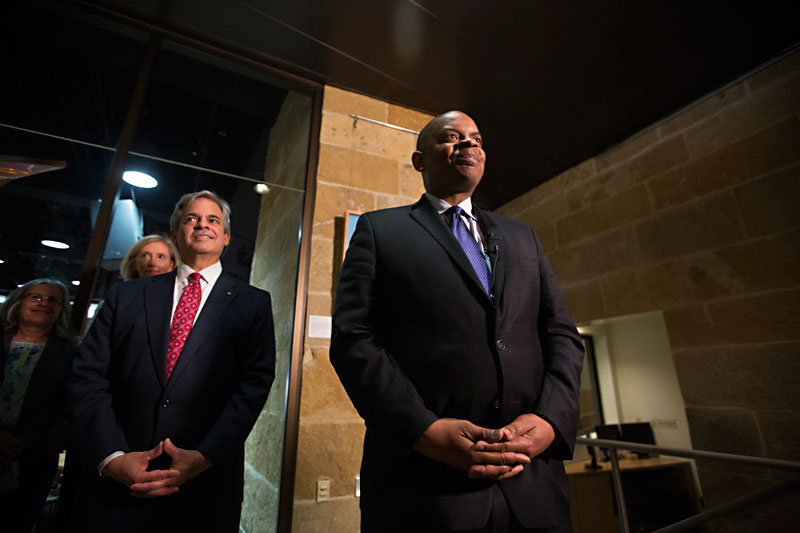Outsmarting Traffic
Austin prepares for the final round of the Smart City Challenge
By Amy Kamp, Fri., May 20, 2016
Next Tuesday, May 24, the city of Austin will submit its final application for the U.S. Department of Transportation's Beyond Traffic: Smart City Challenge. Austin is one of seven finalists for the $50 million grant package.
USDOT, which will provide $40 million of the funding, devised the grant to let a city "address community challenges such as the lack of access to ... employment options, affordable housing, health care, education, economic prosperity, and emerging technologies," as Austin Transportation Department Director Robert Spillar put it in a memo to city officials. Grant applications should "demonstrate how improved access, using emerging mobility technologies and services, might address or resolve historic barriers to opportunity."
U.S. Secretary of Transportation Anthony Foxx visited Austin on Tuesday, May 17, as part of a weeklong tour of the seven finalists. (The others are San Francisco, Denver, Pittsburgh, Kansas City, Portland, Oregon, and Columbus, Ohio) Foxx told a roundtable at City Hall that "the challenge comes at a very important time in our nation's trajectory in transportation. ... Aging infrastructure is ending its useful life" and needs to be repaired or replaced as the population is growing. Unfortunately, "investments are going down, while pressure on the system is going up." Foxx said the challenge was designed to "ferment a really aggressive set of ideas about the future."
It was clear from both his remarks on Tuesday, as well as the tone of a press call held on Monday, that Foxx is frustrated by the lack of willingness to invest in infrastructure by the U.S. and state legislatures. But, he said, "government is its most nimble at the local level" (of course, it's also the most limited in finding money to fund projects).
Mayor Steve Adler, in kicking off the roundtable discussion, said that Austin recognizes that its two biggest challenges – mobility and affordability – are intertwined. "We're the epicenter of what happens when you're a fast-growing city," Adler said. "We would love to win the challenge; we think we should win the challenge ... but we're going to do this regardless."
"This" is a set of plans to use technology to solve Austin's beastly transportation problems. Among the pilot projects the city is proposing is a management innovations center, in partnership with the "Texas Research Triangle" (UT, Texas A&M, and the Southwest Research Institute of San Antonio), TxDOT, Capital Metro, the Central Texas Regional Mobility Authority, and Travis County. This would be a "traffic management center and so much more," said Spillar on Tuesday. He expressed hope that the center could be a place where new academic experts are trained – "we have a complete deficit of trained experts."
Another project that was heavily talked up was using Austin-Bergstrom International Airport as a "controlled, semi-open environment" to test automated vehicles. Spillar said ABIA was an ideal choice because there's already a need to move people from terminals to remote transit service locations, and because the "airport is full of early adopters" who would be exposed to the new tech.
Many of the roundtable participants, including Adler, emphasized the difficulty Austin faces as the most economically segregated city in the U.S. In his opening remarks, Foxx had made much the same point about infrastructure in America in general, as he has in the past. "In most civilizations, there's an in group and an out group. If you look at infrastructure, infrastructure expresses those values in concrete, steel, and asphalt." The challenge, he said, is for a city to think "about the entire community at the front end and not incrementally as it goes through the process." Foxx ended the roundtable on an optimistic note, saying, "I've told my team that we want to make sure that all the cities that have chosen to compete end up with a pathway to get their projects done. ... We intend to be with you either way in moving forward."
The winner of the Smart City Challenge is expected to be announced the week of June 20.
Got something to say on the subject? Send a letter to the editor.










